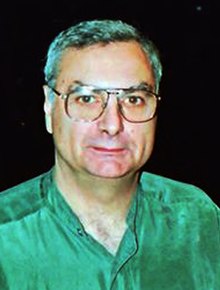| Yair Rosenblum | |
|---|---|
 | |
| Background information | |
| Born | (1944-01-06)January 6, 1944 Tel Aviv, Mandate of Palestine. |
| Origin | Tel Aviv, Israel. |
| Died | August 27, 1996(1996-08-27) (aged 52) Holon, Israel |
| Genres | Israeli pop, Israeli rock. |
| Occupation(s) | Composer Arranger |
| Years active | 1962-1996 |
| Labels | Hed Arzi Music |
Yair Rosenblum (Hebrew: יאיר רוזנבלום; January 6, 1944 – August 27, 1996) was an Israeli composer and arranger.
Music career
Rosenblum was born in Tel Aviv. He was musical director of the Israel Defense Forces chorus in the 1960s and 1970s. He directed Israel's annual music festivals.
For the army and navy ensembles of the Israel Defense Forces, he oversaw conducting and wrote music. He is best known for such songs, including Shir LaShalom (1970). He composed songs for films and television, and worked with a number of bands and choral groups, including primarily the IDF bands. He wrote more than 1,000 songs, including "Ammunition Hill", "In a Red Dress," "The Beautiful Life," "Tranquility," "Hallelujah,""We must keep on singing" and "How should I bless him?."
Death
Rosenblum died in Holon in 1996, at the age of 52, after a two-year battle with esophageal cancer. After his death, his daughter Karen accepted the ACUM Prize for lifetime achievement on his behalf.
References
- Motti Regev; Edwin Seroussi (2004). Popular music and national culture in Israel. ISBN 9780520236547. Retrieved July 28, 2011.
- Phillip Vannini; J. Patrick Williams (2009). Authenticity in culture, self, and society. ISBN 9780754675167. Retrieved July 28, 2011.
- Marc Rosenstein (2010). Galilee diary. ISBN 9780807410783. Retrieved July 28, 2011.
- "Yair Rosenblum". RadioHazak. June 11, 1995. Retrieved July 28, 2011.
- ^ Marsha Bryan Edelman (2003). Discovering Jewish music. ISBN 9780827610279. Retrieved July 28, 2011.
- ^ Naomi Segal (August 30, 1996). "Composer of 'Peace Song' dies". Jweekly. Retrieved July 28, 2011.
- Joel N. Eglash (2002). The Complete Jewish Songbook: The Definitive Collection of Jewish Songs. ISBN 9780807408216. Retrieved July 28, 2011.
- Union of American Hebrew Congregations; National Federation of Temple Youth (1997). Shireinu = Shirenu : our songs : a songbook for camps, conclaves, kallot and retreats. New York: Transcontinental Music Publications. ISBN 0-8074-0622-8. OCLC 39133908.
- Un'taneh Tokef; Lawrence A. Hoffman (2010). Who by fire, who by water-Un'taneh tokef. ISBN 9781580234245. Retrieved July 28, 2011.
- Oliver Leaman (2001). Companion encyclopedia of Middle Eastern and North African film. ISBN 9780203426494. Retrieved July 28, 2011.
- Amy Kronish; Costel Safirman (2003). Israeli film: a reference guide. ISBN 9780313321443. Retrieved July 28, 2011.
- Gil Zohar (February 23, 2007). "Old soldiers never die". The Jerusalem Post. Archived from the original on November 7, 2012. Retrieved July 28, 2011.
- Helen Kaye (January 23, 1997). "Songwriter Moshe Willensky dies at 87". The Jerusalem Post. Archived from the original on November 7, 2012. Retrieved July 28, 2011.
External links
Categories: